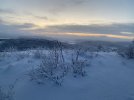Are you a hiker or a walker?
Those of you who’ve appreciated this thread may be rewarded further by reading David Rompf’s
Walking with Thoreau: A Review Essay, linked here:
https://www.harvardreview.org/content/walking-with-thoreau/
I have not read
Six Walks: In the Footsteps of Henry David Thoreau by Ben Shattuck (Tin House, 2022), but Rompf’s essay about the book is articulate and rich with copious associations related to walking and its intentions and purposes. Its reading may be the café con leche many of us enjoy in mornings on The Camino.
Upon first reading @Trecile’s original post, my thought was, for me, it is the intention that distinguishes whether I am a walker or a hiker. In the context of Rompf’s essay, I think I am a walker even when I am hiking or backpacking. My intention found in each endeavor is similar,
i.e., with all senses, to embrace my surroundings, and, in doing so, lighten, at least temporarily, physical and
psychological freight and infuse my being with new beginnings.
To further pique your interest, I offer part of Rompf’s opening and closing—
“The longest single walkable distance on Earth is a little more than fourteen thousand miles, between Cape Town, South Africa, and the Russian port city of Magadan on the Sea of Okhotsk. [***] The epigraph for Six Walks is a definition: ‘Footstep (‘fóot, step): A step taken by a person in walking, especially as heard by another.’ In these pages we hear an echo across time, terrain, and imagination: Thoreau rustling in the distance as Shattuck moves forward with his life. You might read this book because you’re a fan of Thoreau, or because you’re an ardent walker and nature-lover....”
—and his shortened excerpt from Thoreau’s Walden Pond:
"Now I yearn for one of those old, meandering, dry, uninhabited roads, which lead away from towns, which lead us away from temptation, which conduct to the outside of earth, over its uppermost crust, where you may forget in what country you are travelling; where no farmer can complain that you are treading down his grass [ … ] along which you may travel like a pilgrim, going nowhither; where travellers are not too often to be met; where my spirit is free; where the walls and fences are not cared for; where your head is more in heaven than your feet are on earth[ … ] where travellers have no occasion to stop, but pass along and leave you to your thoughts; where it makes no odds which way you face, whether you are going or coming, whether it is morning or evening, mid-noon or midnight [ … ] where you can walk and think with the least obstruction, there being nothing to measure progress by; where you can pace when your breast is full, and cherish your moodiness [ … ] by which you may go to the uttermost parts of the earth.
[ … ] There I can walk and stalk and pace and plod. [ … ] That’s a road I can travel [ … ] There I can walk, and recover the lost child that I am without any ringing of a bell [ … ] There I have freedom in my thought, and in my soul am free."

























